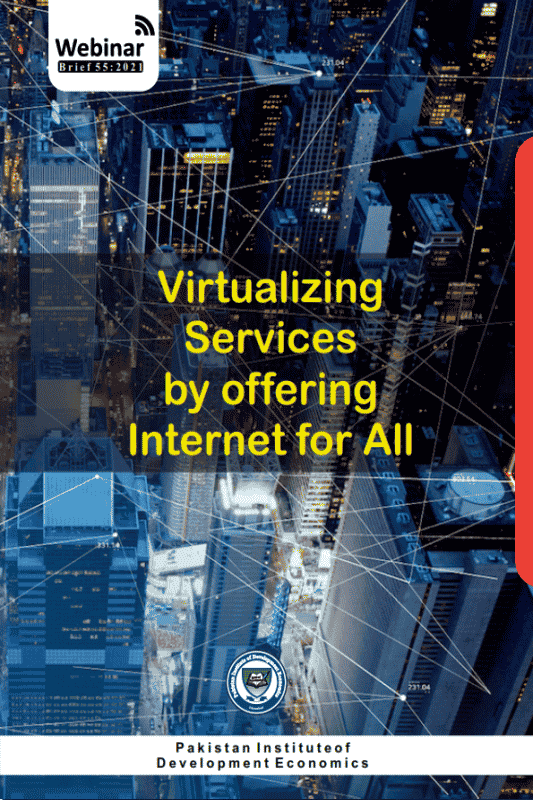
Pakistan Institute of Development Economics
- Home
Our Portals
MenuMenuMenuMenuMenuMenuMenu - ResearchMenuMenuMenuMenuMenuMenuMenu
- Discourse
- The PDR
- Our Researchers
- Academics
- Degree Verification
- Thesis Portal
- Our Portals
Virtualizing Services by offering Internet for All (Webinars Brief 55:2021)
Virtualizing Services by offering Internet for All
Preamble
The dilemma of the government in Pakistan is that it considers the internet as a luxury instead of a necessity without realizing the scope of the internet that goes beyond social networking. The internet has become a vital part of all industries in the modern era, including education, health, business, banking, and agriculture. It is a time to review our policies to make the internet and devices more accessible to the general public, allowing for wider penetration.
Dr. Nadeem ul Haque started the discussion with this question
In Pakistan, the internet is considered a luxury. Sadly, the government taxes the use of the internet and internet devices. So, how do we achieve “internet for all”?
Key Messages
Mr. Khalid Raza
There are two challenges to the internet for all
- Restricted Telephony
Unfortunately, WhatsApp calls are restricted in the Middle East. The government should deregulate the taxes imposed on the spectrum of the internet. Big companies are struggling to see future innovations since the internet has evolved into a content delivery service like Facebook and Netflix in the last decade.
The next decade of internet usage is not the consumers because we hear that there will be around 6 billion users and 30 billion IT devices. The edge is the source of data, it will be consumed and it is monetizable. “Data is the next oil.”
- Unreliable Delivery
We need the original internet architecture with the universal addressing model. Right now, we can not trust our internet connection during a video call or a remote surgery. So, basically “digitalization is a threat to those who do not transform.” With the world now changing, and as technology is improving, we need to make sure that the internet is not becoming a hurdle but allowing us to grow with the world.
Solutions to the challenges
- The 5G bandwidth for high internet speed. This will allow us to trust the internet connectivity during a video call or a remote surgery. It is required so that we can innovate and learn through technology.
- The right internet architecture with a universal addressing model. It will lead us to go from companies to individuals to monetize data. It would reduce the cost, and therefore the service would be available to everyone.
Mr. Ahmed Shahid
- He worked for seven years on 5G base station equipment at Valley Communications and worked on LTE baseband networks.
- We have an example of Reliance Jio, which was a major project in India to bring 5G, by just one individual. After looking at the infrastructure of it and how it changed the internet connectivity there, we began to wonder what is the hurdle for Pakistan in achieving 5G?
Hurdles
- Pakistan’s communications infrastructure is too heavily regulated.
- The spectrum auction has failed thrice for the 5G network due to heavy regulations of the government.
Dr. Suhail Chughtai
As an orthopedic surgeon, he has been solving medical problems through technology. There are various methods like Direct Telesurgery, Assisted Telemedicine, and Telecare at home which can be used to help treat patients. We have successfully helped the population cope with the coronavirus, and be responsive and give the best treatment to the nation using the facilities that we have. We can treat patients in remote locations and assist them with some acute diseases, but for major surgeries, we require higher bandwidth and better internet connectivity. This will help the people living in remote locations to get the best health care services without traveling to bigger cities.
Mr. Imran Qureshi
The challenges faced during virtual learning:
- Lack of computer-aided training of teachers and students.
- Weak internet connection for video calls.
- Laptops are expensive and, not everyone can afford them.
Solutions
- Government should reduce taxes on devices such as laptops and mobile phones.
- There should be training workshops for teachers and students.
- The should be a government policy of compliance and consumer data.
Conclusion
The internet for all has become a necessity far greater than cars. It is not a source of revenue but a source of income.



